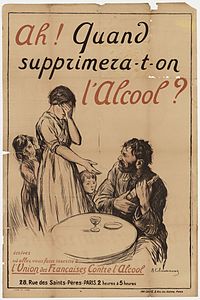
Photo from wikipedia
Earlier age at menopause is associated with increased long-term health risks. Moderate alcohol intake has been suggested to delay menopause onset, but it is unknown whether alcohol subtypes are associated… Click to show full abstract
Earlier age at menopause is associated with increased long-term health risks. Moderate alcohol intake has been suggested to delay menopause onset, but it is unknown whether alcohol subtypes are associated with early menopause onset at age 45. Therefore, we aimed to evaluate risk of early natural menopause among n=107,817 Nurses' Health Study II members followed from 1989-2011. Alcohol consumption overall, and by subtypes including beer, red wine, white wine, and liquor was assessed throughout follow-up. We estimated hazard ratios (HR) in multivariable models adjusting for age, body mass index, parity, smoking and other potential confounders. Women reporting moderate, current alcohol consumption had lower risks of early menopause than non-drinkers. Those reporting 10-14.9 g/day had lower risk of early menopause compared to non-drinkers (HR = 0.81, 95% confidence interval (CI): 0.68, 0.97). Among specific beverages, evidence of lower early menopause risk was confined to white wine, and potentially red wine and liquor, but not to beer. Data from this large prospective study suggest a weak association of moderate alcohol intake with lower risk of early menopause, which was most pronounced for consumption of white and red wine, and liquor. High consumption was not related to lower early menopause risk.
Journal Title: American journal of epidemiology
Year Published: 2021
Link to full text (if available)
Share on Social Media: Sign Up to like & get
recommendations!